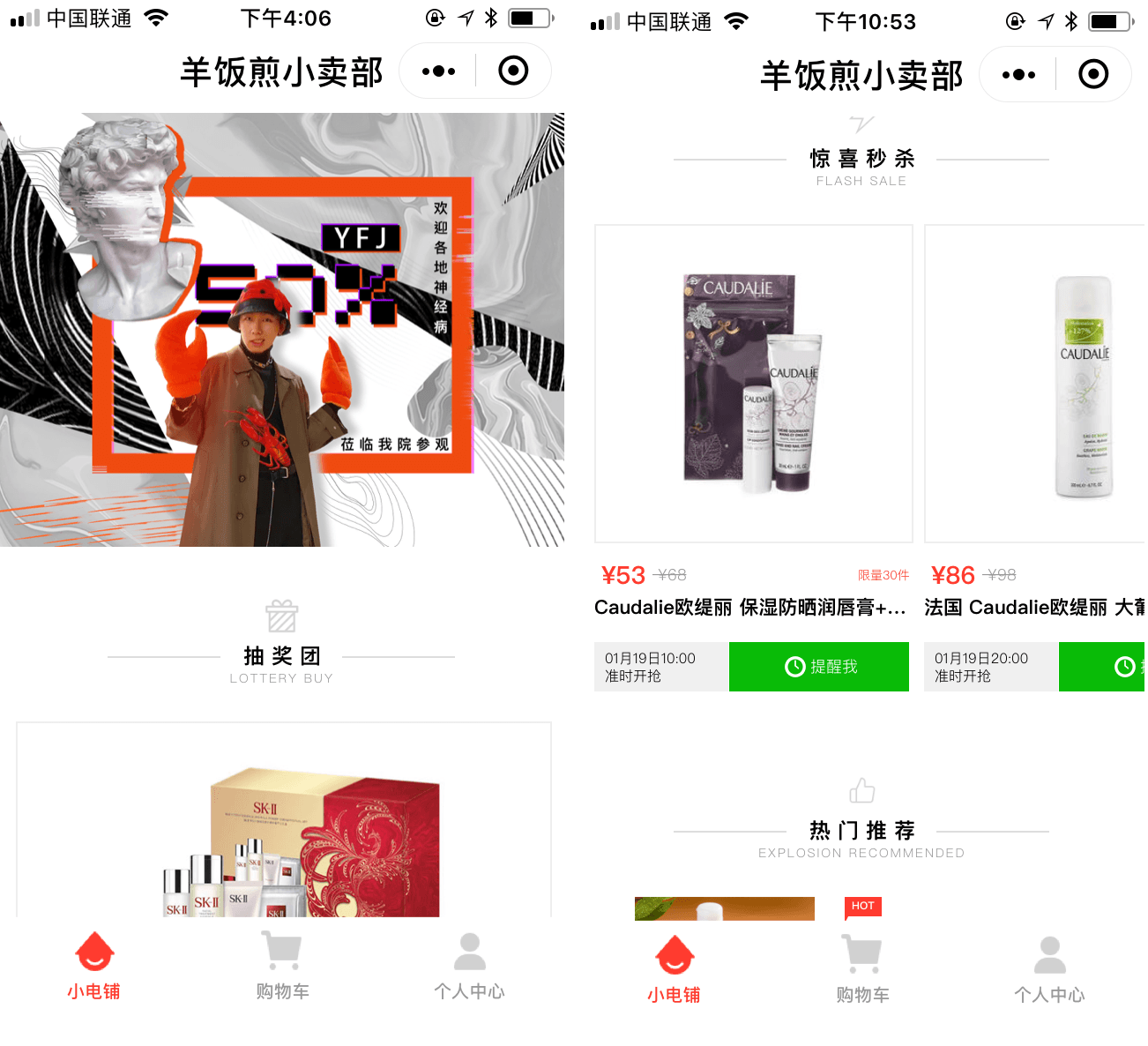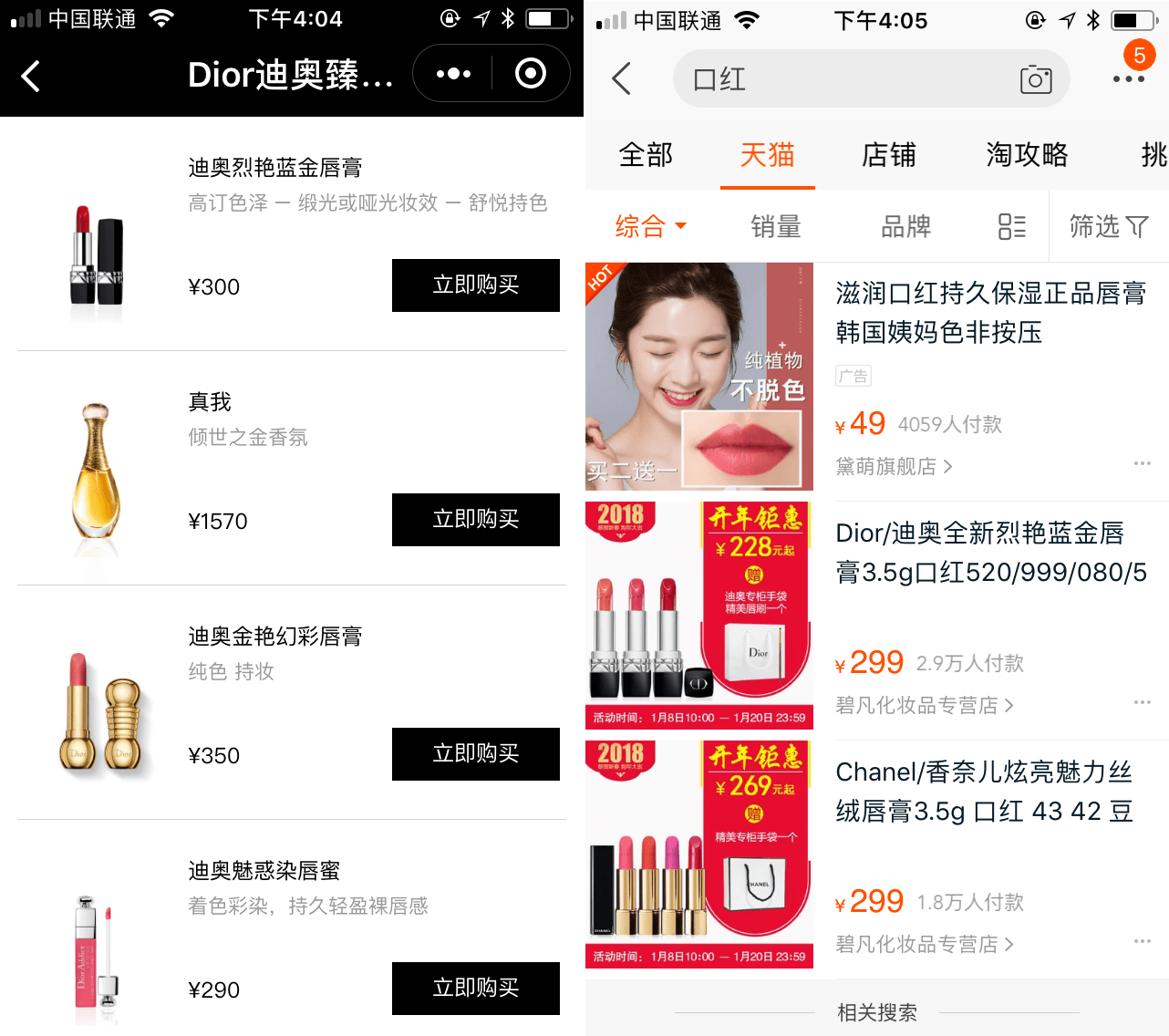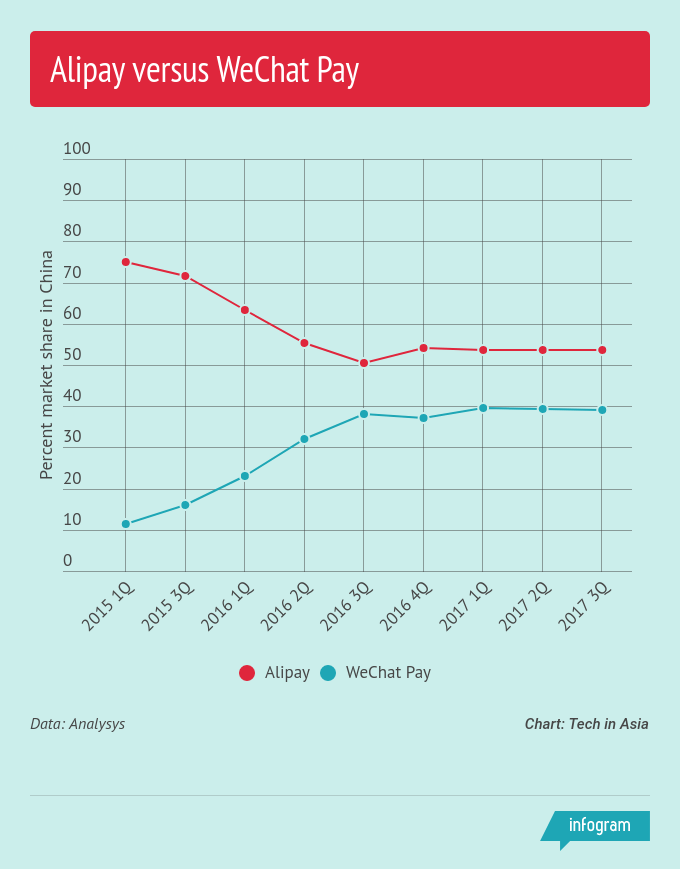
Photo credit: Ashim D’Silva / Unsplash
In China, tech behemoths Tencent and Alibaba have carved up the industry according to their respective strengths: Tencent has claimed gaming and social networking, whereas Alibaba has made ecommerce its raison d’etre.
But as Tencent’s superapp WeChat eyes growth in payments and offline services, the company is venturing into what has traditionally been Alibaba’s turf: retail.
In particular, WeChat mini programs are providing shops with new ways of selling products, such as group buying deals that are facilitated through chat groups. Embedded inside WeChat, mini programs are lightweight apps that don’t have to be installed, and can range from ride-hailing and food delivery, to live streaming and shopping. And thanks to the app’s massive social network, brands and shops on WeChat can potentially tap into its 980 million monthly active users.
Since their launch last year, 580,000 mini programs have come up on WeChat. They have a total of 170 million daily active users, according to Tencent.
Since their launch last year, 580,000 mini programs have come up on WeChat.
“Following WeChat’s big push for mini programs, you can see that more and more stores, brands, and platforms are setting up shop on WeChat, because they benefit from WeChat’s large user base and social sharing functions,” Mo Jia, an analyst at market research firm Canalys, tells Tech in Asia.
“In that way, mini programs and WeChat Pay, the app’s mobile wallet, could pose a threat to Alibaba’s online business,” Mo continues, though it remains to be seen how Tencent manages shops on the WeChat platform, as well as related issues like counterfeit goods. To date, the superapp has shut down 875 mini programs for selling fake goods.
See: These hustlers make a living off WeChat’s thriving underground ecommerce
Social commerce
Though Tencent’s early attempt at ecommerce – an online bazaar called Paipai – was shuttered in 2015, the Shenzhen-based tech giant remained an active investor, choosing to support ecommerce businesses instead of engaging directly. Today, many of those investments have become important hubs of ecommerce within the WeChat ecosystem.
Tencent-backed Pinduoduo, for instance, has embedded its entire ecommerce platform inside WeChat. The startup takes advantage of each user’s social network by offering discounts for group purchases. A box of diapers might cost US$6 if you buy it alone – the price drops to about US$4 if you rope in other friends.
A box of diapers might cost US$6 if you buy it alone – the price drops to about US$4 if you rope in other friends.
“You’ll notice that mini programs that are suitable for WeChat […] will be able to grow their customer base quickly,” Chen Qi, CEO of online fashion company Meili United Group, told media at WeChat’s annual conference on Monday. For example, group buying and live streaming – where influential bloggers or personalities talk about products they love – can bring in new traffic, he explained.
Tencent is also an investor in Meili United Group, which consists of two fashion ecommerce startups, Meilishuo and Mogujie, that merged in 2016. According to Meili, the company has attracted 20 million new customers since launching its mini program last summer.

Blogger Yang Fan Jian’s mini program shop, where shoppers can participate in flash sales and limited discount offers.
Outside of ecommerce platforms within the app, WeChat mini programs are also changing how influential bloggers make money from their fanbase. Previously, social media influencers could only direct followers to their online shops through a link at the bottom of blog posts. Through mini programs, bloggers can now embed their stores directly inside their article.
According to ParkLu, an agency that helps brands collaborate with social media influencers, the introduction of mini program shops has doubled clickthrough rates for some bloggers, such as fashionista Becky Li.
“Mini programs will give key opinion leaders another opportunity to monetize or more easily monetize,” says Elijah Whaley, chief marketing officer of ParkLu.
“If [we] think of mini programs as apps, it really opens up the potential far beyond selling stuff,” he adds, such as mini apps that let users pay for more content, Q&A sessions, event organizing, or even games.
However, mini programs won’t be a “silver bullet” for social media influencers, Whaley emphasizes. Only a small percentage of bloggers actually make a living from their fanbase – “the rest are starving” or doing it as a side-gig, he says.

Left: Dior’s mini program shop in WeChat, which can be found through Dior’s official account. Right: A search for lipstick in Tmall shows multiple brands – better for price comparison.
Other companies, such as SEE, are targeting bloggers with the express goal of helping them operate their own mini program shops. SEE also helps clients, such as fashion blogger ‘Yang Fan Jian,’ with organizing flash sales and logistics.
When you’re on WeChat, you are making an emotional purchase
“When you’re on WeChat, your purchase is more emotional,” says Aurelien Rigart, co-founder and vice president of IT Consultis, a Shanghai-based tech provider that helps brands set up mini programs and digital assets, among other services.
Unlike Alibaba’s Taobao and Tmall sites, where buyers can search for products across different stores to compare pricing, WeChat shops are tied to individual brand accounts. That gives shops more control over the user experience, but it also means they have to trigger sales through time-sensitive discounts, good content, or other types of “push marketing,” says Rigart.
“WeChat is a closed ecosystem – you need to already be a follower of the brand’s official account,” he explains. “If the brand doesn’t appeal to you after three or four posts, you will just unfollow the brand.”
Payments to retail
To be sure, the scale of ecommerce on Tencent is nowhere near that of Alibaba, whose Chinese ecommerce platforms logged 454 million shoppers in 2017.
At its core, WeChat is still a social networking app, which means that it isn’t yet optimized for searching for products, says Matthieu David, CEO of Daxue Consulting. Alibaba’s ecommerce sites, Taobao and Tmall, are also “clearly better” than WeChat when it comes to advertising.
But Tencent’s approach to retail is also starkly different. For one, the Shenzhen-based company isn’t selling any products itself, nor is it charging brands to set up shop inside WeChat.
Tencent will profit by scraping together billions of pennies worth in commission fees.
Like its lucrative gaming business, which makes a fortune through millions of in-game purchases like virtual weapons, Tencent will profit by scraping together billions of pennies worth in commission fees. For underneath every transaction on WeChat is WeChat Pay, the app’s digital wallet. While Alibaba started with ecommerce before kicking off payments, Tencent seems to be working the other way around.
“Tencent has always promoted its own digital wallet, WeChat Pay, which competes with [Alibaba’s] Alipay,” says Mo. Through mini programs, the company hopes to make WeChat Pay the new normal for shoppers, especially in offline scenarios, like brick-and-mortar shops and restaurants, he adds.

Closing the gap (note: data not available for the second and fourth quarter of 2015)
Currency converted from Chinese yuan. Rate: US$1 =RMB 6.42.
This post In WeChat, sellers are experimenting with new models of ecommerce appeared first on Tech in Asia.
from Tech in Asia https://www.techinasia.com/wechat-mini-programs-ecommerce
via IFTTT
No comments:
Post a Comment